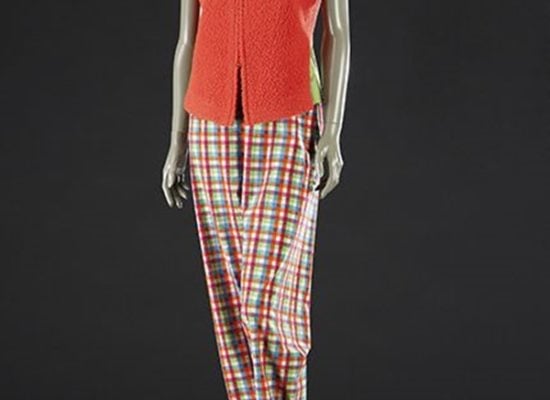The Indianapolis Museum of Art (IMA) has spent over nine years honing their collection of avant garde fashion designs. This year, they are able to debut their efforts in an exhibition, simply titled, “Cutting Edge Fashion: Recent Acquisitions.”
The show will look at an array of pioneering designers who have altered the fashion conversation world—be it through new silhouettes, innovative use of materials and draping, or the subversion of the status quo. Viewers, for instance, will find a design by Austrian-born fashion designer Rudi Gernreich, the inventor of the topless single-piece swimsuit, the monokini.
“Many American designers were copying Parisian clothing after the war. But while the likes of Christian Dior were creating corsets, Rudi was creating corset-free garments, like the monokini swimsuit and the ‘no-bra’ bra,” Niloo Paydar, curator of textile and fashion arts at the IMA told Blouin Art Info. “His bathing suit was so early for someone in the 1950s, but now you see that cut design everywhere in contemporary swimsuits.”
With more than 60 garments from designers such as Alexander McQueen, Christian Lacroix, Issey Miyake, Rei Kawakubo, and Yohji Yamamoto, the show is an all-encompassing exhibition, displaying evening gowns from the 1920s alongside punk-inspired garments of the 1970s, and even some much-maligned pantsuits from the early 2000s. The items on view show the evolution of, and recycling in, the fashion world.
For instance, Gernreich’s moss green maillot shows cut-outs from the side, a design detail recently seen on Miley Cyrus‘s Alexander Wang gown at the Met Gala (See 25 Images of The Glamorous Metropolitan Museum Costume Institute Gala 2015). Callot Soeur‘s asymmetrical velvet evening dress from the 1920s is another example of sartorial transformation. Here, a material traditionally reserved for nobility (and prom dresses) has been updated in Nicolas Guesquiere’s Spring 2015 collection for Louis Vuitton, where it was applied to a contemporary pantsuit.
This is not the first fashion exhibition the IMA has staged, of course. In 2012, the museum celebrated American designers hailing from Indiana in “An American Legacy: Norell, Blass, Halston & Sprouse.”
“Cutting-Edge Fashion: Recent Acquisitions” is on view at the Indianapolis Museum of Art until January 3, 2016.
